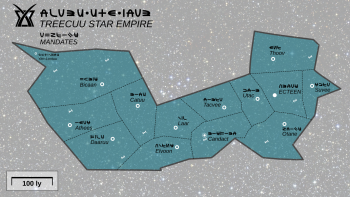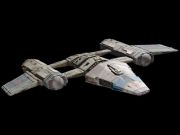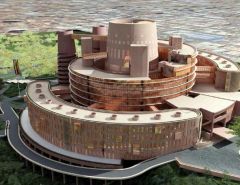Treecuu Star Empire (A1-0): Difference between revisions
No edit summary |
No edit summary |
||
| Line 93: | Line 93: | ||
=== Contemporary === | === Contemporary === | ||
After the annexation of Bicaan in the northwestern reaches of the Empire, military expansion decreased significantly due to encountering stronger and more cohesive star nations, and fearing overstretching the supply lines. The last planet to be annexed was Yim-Lootuu III, also known as by its native name Aryyt't. The Aryyt't managed to send a [[FTL technology (A1-0)#Slipspace|slipspace]] probe with a distress call which visited over a hundred of systems before being destroyed while jumping to a Treecuu-controlled system. The distress call was received by [[ | After the annexation of Bicaan in the northwestern reaches of the Empire, military expansion decreased significantly due to encountering stronger and more cohesive star nations, and fearing overstretching the supply lines. The last planet to be annexed was Yim-Lootuu III, also known as by its native name Aryyt't. The Aryyt't managed to send a [[FTL technology (A1-0)#Slipspace|slipspace]] probe with a distress call which visited over a hundred of systems before being destroyed while jumping to a Treecuu-controlled system. The distress call was received by [[Drakari Celestial Imperium (A1-0)|Drakari Celestial Imperium]] and the [[Venterran Federation (A1-0)|Venterran Federation]] which promted the Treecuu government to attempt establishing formal relations with these star nations to learn about their attitudes about the annexations and prevent any measures to be taken to recind the control of Aryyt't. These events led to a change in Treecuu foreign politics, shifting to a policy of seeking international recognition of claimed territory and cementing the Treecuu precense. To that end, trade agreements were made with the [[Ryccian Empire (A1-0)|Ryccian Empire]] and extensive cooperation has been achieved with the Stoinian Star Kingdom with which there is much in common in terms of self-image and history. The Treecuu and Stoinians have signed a non-agression pact, and it is large believed that the two nations will form an alliance soon. | ||
The CEE has further increased its power by having one of its members, Ivict, as foreign minister, gaining direct control of the Diplomatic Corps and the negotiations with other star nations. However, as the direct control of the governors and CEE is not normally felt by most Treecuu citizens, they are not aware or concerned with the elected government loosing its say in matters of controlling subject worlds or what the foreign relations should be with distant star nations. | The CEE has further increased its power by having one of its members, Ivict, as foreign minister, gaining direct control of the Diplomatic Corps and the negotiations with other star nations. However, as the direct control of the governors and CEE is not normally felt by most Treecuu citizens, they are not aware or concerned with the elected government loosing its say in matters of controlling subject worlds or what the foreign relations should be with distant star nations. | ||
Revision as of 18:29, 30 March 2021
| OOC NOTE Some facts in this article about the Treecuu Star Empire are not general knowledge IRP. |
Treecuu Star Empire | |
|---|---|
 Overview of the Treecuu Star Empire | |
| Motto | "Peace through order. Order through domination. Domination through expansion" (unofficial) |
| Founded | ~200 standard years ago (Treecuu Republic reorganised) |
| Location | Sector A1-0, (500-1200,300-600 lys) |
| Capital | Ecteen (Irveem City) |
| Population | Total: 877 billion
|
| Head of state | President Cuul |
| Head of government | President Cuul |
| Major species | "Treecuu": (Limavu, Teetac)* |
| Language | Treecuu Common |
| Key technology | Folding space warp drive Quantum communications Quantum synthesis |
| Military | Interplanetary:
Planetary:
|
| Intelligence service | State Security Agency Mandate Surveillance Service |
| Enemies | Loo-Yee |
| Key people |
|
| Currency | Uut |
The Treecuu Star Empire (Treecuu Common: ![]() , Treecuu-uumth-aateec) is a young, rapidly expanding star nation in Sector A1-0, approximately stretching between 500-1200 lys horizontally and 300-600 lys vertically. Commonly it is estimated that the empire comprises 33,000 star systems, of which at least 7,400 are settled to some degree. It borders the Zelvan Regime to the north-west, the Badlands of Anarchy to the north, the Stoinian Star Kingdom to the south-east, and the vast Veentcu badlands to the east. Founded about 200 standard years ago in the aftermath of the so-called Loo-Yee Calamities, the empire is built on the principle of subjugating neighbouring civilisations that are not capable of defending themselves in order to prevent them from maintaining interstellar spaceflight, and to enforce a Treecuu monopoly on movement and communication, with the ultimate goal of maintaining order and peace. The Treecuu Star Empire maintains an isolationist policy and its extensive network of buoys marking the territory claimed is well-known. However, following the Aryyt't Incident, the empire has begun seeking to establish diplomatic relations with other star nations in the sector and to gain recognition as the sovereign entity of the space it claims.
, Treecuu-uumth-aateec) is a young, rapidly expanding star nation in Sector A1-0, approximately stretching between 500-1200 lys horizontally and 300-600 lys vertically. Commonly it is estimated that the empire comprises 33,000 star systems, of which at least 7,400 are settled to some degree. It borders the Zelvan Regime to the north-west, the Badlands of Anarchy to the north, the Stoinian Star Kingdom to the south-east, and the vast Veentcu badlands to the east. Founded about 200 standard years ago in the aftermath of the so-called Loo-Yee Calamities, the empire is built on the principle of subjugating neighbouring civilisations that are not capable of defending themselves in order to prevent them from maintaining interstellar spaceflight, and to enforce a Treecuu monopoly on movement and communication, with the ultimate goal of maintaining order and peace. The Treecuu Star Empire maintains an isolationist policy and its extensive network of buoys marking the territory claimed is well-known. However, following the Aryyt't Incident, the empire has begun seeking to establish diplomatic relations with other star nations in the sector and to gain recognition as the sovereign entity of the space it claims.
The Treecuu Star Empire has a population of about 577 billion Treecuu, which all enjoy full citizenship, and about 300 billion so-called subject species, which are isolated on their respective planets of origin, barred from owning faster-than-light technology. The total number of inhabitants is significantly lower compared to most other star nations in the sector, but a successful aggressive government campaign has ensured a very high population growth rate of the Treecuu. Treecuu space is divided into thirteen mandates, each governed by a cirth (governor) who enjoys extensive personal power, being directly responsible for matters regarding law enforcement, industrial development and most importantly asserting dominance over the subject species under their control. Nominally a democracy, the empire is governed by an elected senate and a president, currently Cuul, having their seat on the planet Ecteen, the capital of the empire and Treecuu homeworld. In reality however, the empire is best described as an oligarchy, with power shifting to the Committee for the Expansion of the Empire consisting of self-appointed members, including the governors and business magnates.
The currency-less Treecuu economy is dominated by the replicator and information technology sectors, with significant contributions by the mining, shipbuilding, foodstuffs and recycling industries. Important native technology includes the folding space warp drive, quantum synthesis and ship cloaking technology. The Treecuu Star Empire has a highly devolved welfare system which is also extended to the subject species. Standard of living is high among the Treecuu and generally fair to high among subject species.
Etymology
The word Treecuu means "shared" in the Treecuu language. It was first used in the constitution written for the foundation of the Treecuu Republic 291 standard years ago, which was also the first official document in the newly constructed language. The full name of the nation, Treecuu Star Empire, could alternatively be translated as the Star Commonwealth, but is not recommended officially.
History
Pre-FTL

The Treecuu nationality includes two different species that evolved on the same world, Ecteen: the Teetac insectoids and the Limavu mammalians. The insectoids where the first to develop an advanced civilisation about 220,000 standard years ago and dominated the planet for millennia. They colonised the Ecteen system and terraformed the neighbouring planet Cin. The insectoids were close to achieving FTL technology, however, a combination of several devastating wars, natural disasters and climate change induced a mass extinction event on Ecteen, forcing the few remaining insectoids off the home world. After a century, only a few thousand individuals on Cin had survived. They did not manage to maintain their advanced civilisation and thus reverted back to a hunter-gatherer type of civilisation. Over time, knowledge of the old world and the advanced technology diminished.
With the insectoids gone, the mammalians, which had survived the mass extinction event in small numbers in the equatorial marshlands, eventually developed an advanced civilisation. As scientific advances were made, traces of the ancient insectoid civilisation were discovered. When telescopes were aimed at the neighbouring planet they soon found it to be habitable. This prompted fast advances in astronomy and space faring technology. 354 standard years ago the mammalians sent their first manned expedition to Cin, leading to first contact between the two races. It was soon established that they were genetically related and shared a common origin. Working together, the insectoids and mammalians rediscovered and reclaimed ancient Teetac artefacts and technology throughout the system. The mammalians managed to cure diseases that had plagued the insectoids for millennia. 301 standard years ago they completed their first FTL flight.
Treecuu Republic
Following the peaceful integration between the insectoids and mammalians and the success of their space programme, it was decided to put their respective planets under a common government to accelerate integration and guarantee peace. The Treecuu Republic was proclaimed 291 standard years ago which included the entire Ecteen system. It was a liberal democracy and the various nations on the planets had a large degree of self-governance. The same year the first deep space exploration missions were launched and warp ships were sent out to neighbouring stars. nine years later first contact was made with the Utacs, an emerging FTL civilisation. The two civilisations maintained a relation of peace and trade. The following decades the Treecuu settled several uninhabited systems and made peaceful contact with the emerging Dacoorans and Catorans. Important breakthroughs in replication technology were made during this time. The total Treecuu population was approximately 30 billion, with a presence in 10-15 star systems.
Loo-Yee Calamities
240 standard years ago technologically advanced nomadic peoples, collectively called the Loo-Yee (in some sources called the Oleth), started visiting Treecuu space in what was likely scouting parties. Soon entire fleets arrived, who proceeded to plunder Treecuu worlds as well as neighbouring nations. After the first waves of Loo-Yee incursion, the Dacoorans hosted a conference with the goal to establish a military alliance between the Treecuu, Utacs, Dacoorans and Catorans. Except for the Catorans opting out, the treaty talks were successful. However, the Loo-Yee returned in greater numbers. The alliance was defeated defending Dacoora, which was thoroughly plundered, but never completely occupied thanks to a strong resistance movement. At the same time the isolated Catorans were almost entirely wiped out by the Loo-Yee. Seeing the fall of the two planets, the Utac negotiated a separate peace with the Loo-Yee, paying in gold and other basic resources to have the Loo-Yee leave them alone.
Utac leaving the war was seen as a great betrayal by the Treecuu, who now faced the Loo-Yee alone. After a period of both sides recovering, Treecuu and Loo-Yee forces clashed in the battle of Treel. The Treecuu deployed antimatter weapons for the first time. The outcome was a tactical draw but a strategic victory for the Treecuu, as the Loo-Yee likely decided it was too costly to continue their campaign in the region. They left and have since not been encountered again. An estimated 60% of all Treecuu was been killed in the war.
Empire reform

Fearing that the Loo-Yee would return, the Treecuu government approached its former allies for a renewed Alliance. The Utac government declined, fearing revenge from the Loo-Yee. The Dacooran government failed to respond due to a collapse of their society following the plundering and infighting. Hardliners within the military persuaded the Treecuu government of the necessity of creating a buffer zone outside Treecuu core space for defensive purposes, and one standard year after the retreat of the Loo-Yee, a Treecuu fleet besieged Utac Prime. A special government body was formed to plan and oversee the creation of the buffer zone, called the Committee for Strategic Security (CSS). The siege lasted two years, and following escalating orbital bombardment, indiscriminately targeting military and civilian targets alike, Utac surrendered unconditionally. The CSS immediately seized Utac mines and production facilities to accelerate the construction of starships for the Treecuu Starfleet. All Utac state functions were placed under Treecuu leadership.
The following two years, under the pretence of helping the Dacooran government regain control of the planet, the Treecuu landed expeditionary forces on Dacoora Prime, which soon came under Treecuu and CSS control, suffering the same fate as Utac. Catora was also occupied, but without resistance. The CSS presented a plan for Treecuu government on how to ensure the survival of the Treecuu and maintain order in space surrounding the Treecuu core worlds involving subjugation of other civilisations through military expansion and a rapid increase in population by encouraging large families through extensive government support. While it was debated in the senate, news of the destruction of Treecuu civilians convoys by the warring star nations Grund and Fee'ehar reached Ecteen, causing mass protests and a popular demand for action. The government responded by voting unanimously in favour of the CSS's plan. It is uncertain if the convoys really were attacked, or if it was a false flag operation arranged by the CSS or certain members of the CSS.
The following year the CSS was reformed into the Committee for the Expansion of the Empire (CEE), being directly responsible for the planning of military expeditions and running subjugated worlds. 200 standard years ago the Treecuu Star Empire was proclaimed following the annexation of Otane, home to a major spacefaring civilisation. The reform introduced the mandates (ebovanes), which are large regions of conquered and settled space directly under a governor which is appointed by the CEE.
During this period, the Treecuu economical system was fundamentally transformed due to the availability of affordable replicators and raw materials, meaning that most Treecuu could produce most basic goods they needed from home. Remaining markets offer goods that are so rare that they are not featured as transferable replicator files, or too energy-demanding for regular replicators. The Treecuu cloaking system was invented during this time, giving the Treecuu fleets an advantage over many other star nations.
Contemporary
After the annexation of Bicaan in the northwestern reaches of the Empire, military expansion decreased significantly due to encountering stronger and more cohesive star nations, and fearing overstretching the supply lines. The last planet to be annexed was Yim-Lootuu III, also known as by its native name Aryyt't. The Aryyt't managed to send a slipspace probe with a distress call which visited over a hundred of systems before being destroyed while jumping to a Treecuu-controlled system. The distress call was received by Drakari Celestial Imperium and the Venterran Federation which promted the Treecuu government to attempt establishing formal relations with these star nations to learn about their attitudes about the annexations and prevent any measures to be taken to recind the control of Aryyt't. These events led to a change in Treecuu foreign politics, shifting to a policy of seeking international recognition of claimed territory and cementing the Treecuu precense. To that end, trade agreements were made with the Ryccian Empire and extensive cooperation has been achieved with the Stoinian Star Kingdom with which there is much in common in terms of self-image and history. The Treecuu and Stoinians have signed a non-agression pact, and it is large believed that the two nations will form an alliance soon.
The CEE has further increased its power by having one of its members, Ivict, as foreign minister, gaining direct control of the Diplomatic Corps and the negotiations with other star nations. However, as the direct control of the governors and CEE is not normally felt by most Treecuu citizens, they are not aware or concerned with the elected government loosing its say in matters of controlling subject worlds or what the foreign relations should be with distant star nations.
Astrography
Situated roughly in the middle of the lower half of sector A1-0, the Treecuu Star Empire lies directly west of the Veentcu Badlands and spans roughly 700 ly due west, covering a centralised cross-sectional area of about 152,800 ly2. It borders the Zelvan Regime to the north-west, the Stoinian Star Kingdom to the south-east and the Badlands of Anarchy to the north.
About 33,000 star systems are located within Treecuu borders, of which roughly 7,400 are settled to some degree. The most populated systems are located towards the east. There are no known black holes in Treecuu space, but a large pulsar named Candact is located in the centre of the empire.
Administrative divisions
The Treecuu and subject species are extremely segregated. On previously uninhabited worlds settled by the Treecuu, only Treecuu citizens are allowed to reside; on subjugated worlds only the natives and a limited number of Treecuu personnel necessary to maintain Treecuu control and extract resources, and their families, are allowed to reside. Therefore there are two separate tiers of administrative divisions of the Treecuu Star Empire: the system tier, which comprises all Treecuu-settled worlds and space stations, currently around 200, and the mandate tier, which comprises all subjugated worlds and not yet settled systems and systems with a population too small to be granted systemship. However, all systems are assigned to a mandate but only have a subordinate role in military matters and certain aspects of interstellar communications and resource extraction. There are 13 mandates, which are further divided into subject systems.
Both the systems and subject systems can be further divided into worlds and subject worlds respectively. Worlds are typically further divided into continents and moons, while subject worlds often are allowed to arrange their own division.
Politics
Government

The Treecuu Star Empire is nominally governed by an elected senate where each system has a specific number of seats based on its population, headed by a president. All systems have an elected local government called a System Council, which sends representatives to the Senate in the city of Irveem, Ecteen. Mandates are governed by governors appointed by the Committee for the Expansion of the Empire, which in turn appoint vice-governors for individual systems, except for the mandate capital which is directly governed by the governor. Subject worlds normally have a large degree of autonomy but have no representation in the mandate governance or the Treecuu Senate.
The self-appointed CEE has de facto control over international affairs, a majority of the military and vital industry and resources.
Elections to the system councils and the senate are held every five Ecteen years, or approximately 4.64 standard years, and all Treecuu citizens have the right to vote and run for a seat. The president is the person who manages to gain the most support in the senate, which is confirmed by a vote.
Domestic policies
Committee for the Expansion of the Empire
...The seat of the Committee for the Expansion of the Empire is located on the newly constructed Uuyaam Station orbiting Candact.
Foreign relations
Propaganda
Military
Economy
Technology
Space travel
Home
Infrastructure
Demographics
The Treecuu Star Empire has a population of about 877 billion biological sapients, of which 577 billion are Treecuu and the rest so-called subject species.
Settlements
The population is firmly segregated into Treecuu and subject species. There are 7,237 systems with an exclusively Treecuu population and 100 subject worlds populated almost exclusively by the native subject species.
Of the 7,237 settled Treecuu systems, 37 planets have a population of around ten billion, 200 systems have a population of about one billion, and 7,000 systems have a population of about one million. Of the subject worlds, 49 worlds have a population of about five billion and 50 worlds have a population of about 1 billion.
Species
Synthetic life
No synthetic/artificial life is recognised in the empire. The Treecuu government has banned the creation of synthetic sentient beings due to a fear of the so-called Tuu-Laarth ("great nullification"), the possible surpassing of synthetics, rendering biological creatures useless. Even before the reorganisation into the empire, the Senate had banned all logical machines that were more than mere computational devices. Synthetics are hunted down and destroyed on subject worlds.
